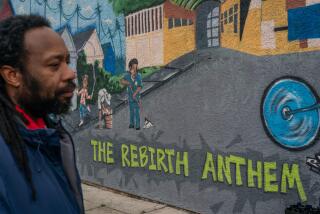COMMODORE CIRCLE: THEN . . .. . . AND NOW : Street Finds Place in the Sun : Renewal: Commodore Circle has freshly painted houses, new flowers, trees and a park. The once-blighted block’s new image earned a new name: Amberleaf Circle.
HUNTINGTON BEACH — A little girl shrieked happily as she rode her tricycle down a new, freshly paved sidewalk. At the end of the street, other children played in a sparkling clean, verdant new park.
Laughter matched the sunny weather, which bathed the freshly painted stucco apartment buildings in warm earth tones. Recently planted flowers bloomed in sidewalk planters; new amberleaf trees showed buds soon to become springtime leaves.
The scene Tuesday afternoon could have been any well-kept, middle-class street in Orange County. But the name on the street sign said “Commodore Circle,” and for years in Huntington Beach, that name was synonymous with “slum.”
Photos of Commodore Circle in 1985 show decaying, graffiti-scarred apartment buildings; littered, broken sidewalks and a small public outdoor area that mainly consisted of debris and a swimming pool full of stagnant water. Yards had no grass, but much junk. Rats and cockroaches infested the living quarters.
“Commodore Circle was the worst block in this entire city,” Mayor Thomas J. Mays said in an interview Tuesday. “It had the worst crime rate. Everything was going on there, including drug dealing. But the changes that have taken place have now made this a real great neighborhood. I think it’s definitely a success story.”
The changes were generated by a five-year, $1.2-million rehabilitation project. The last improvement to the cul-de-sac was completion last week of the park at the end of Commodore Circle, former site of the unusable swimming pool.
So much has changed on Commodore Circle that the city decided that even the street name itself should be changed. In a little-noticed action last week, the City Council by unanimous vote officially renamed the street Amberleaf Circle.
“The character of this area has drastically changed,” read a staff report that urged the council to change the street name, “however the property owners on this street believe that a negative image remains attached to the neighborhood which can be directly linked to the current street name. Changing the name of the street would recognize the changes made to the entire area through the efforts of the city and the property owners.”
The council agreed. Thus the name Commodore Circle will soon come down off street signs. And that, said city officials on Tuesday afternoon, will complete the saga of converting Commodore Circle from slum to showplace.
“It is good now and I am happy here,” said resident Lupe Vasquez, mother of three. “There are no more problems.”
Pat Spencer, city director of redevelopment and housing, said city government attacked the slum problem on a variety of fronts.
“Many of the landlords at one time were absentee owners, and we went after them to fix up the property,” Spencer said. “One property owner was even jailed because he didn’t comply with the law.
“Then things started changing. New owners started taking over the property, and the city worked with them, getting them low-cost rehabilitation loans. Of the 20 fourplexes on this street, all but one have gotten rehabilitation loans, and that one property owner wanted to do it all himself.”
The net result, Spencer said, is that all 20 apartment buildings on the street were rehabilitated and strictly brought up to city code, inside and outside.
“One big problem in the past was that these units were overcrowded,” Spencer said. “There were 50 men living in one of these fourplexes. They slept on mattresses in shifts. But that’s gone. Now there are nothing but families who live in the units. We’ve put the emphasis on making this a family-oriented street.”
Spencer said that before the city crackdown on Commodore Circle, about 500 persons lived in the 80 apartments in the 20 fourplexes. Today, Spencer added, the residents number only about 320.
Spencer said that a key point in rehabilitating the street was to keep low-cost housing and not force families already there to leave. He said that goal was achieved through use of federal subsidies to the apartment landlords.
“Rents range from about $725 for a two-bedroom unit to $800 for a three-bedroom unit,” Spencer said. “But a family in many cases does not pay that amount but only 30% of their income. So in some cases a family may be paying only $100 or so a month for one of these units.”
The interiors of the apartment complexes are now as tidy as the outsides, city officials said. By contrast, only three years ago some units had kitchens and bathrooms that did not function. “Some units had upstairs bathrooms where the toilets were stopped up and the residents were throwing buckets of raw sewage out the windows,” Spencer said.
But no longer.
“Now this is a clean place to live, and people are not in the street,” said Teresa Salazar, the mother of nine children, as she stood outside her apartment.
In the bright sun that danced off flowers and newly planted grass on Tuesday afternoon, Alva Perez, 19, held a neighborhood child and smiled at the pleasant surroundings. She said she was glad the name Commodore Circle, like the old street itself, will be a thing of the past.
“It used to be embarrassing to say I lived here,” she said. “Now it’s definitely a nice place. It’s not at all like it used to be.”
The Changing of a Neighborhood Former name: Commodore Circle New Name: Amberleaf Circle Rehabilitation begun: late 1985 Rehabilitation completed: Last week (Feb. 20-26) Public funds expended: About $1 million Private funds expended: $200,000


